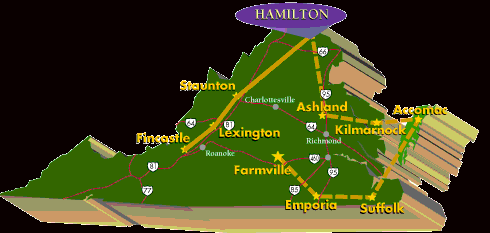
Download
in PDF Format
The
population in Hamilton is 620. It was incorporated on Feb. 18, 1875.
Imagine a town-green meeting in Colonial
Boston. All the citizens get together, talk about the problems facing
their small community, and agree on ways to make life better. Everyone
gets to talk.
|
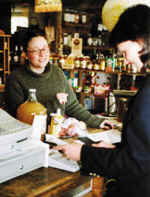
Molly
Andrews chats with store clerk Sue Phillips at the Natural
Mercantile, Hamilton's "whole grocer." |
Now imagine that Norman Rockwell painted
a portrait of that town-green get-together.
You�re in Hamilton. It�s never
abandoned its roots, put down by Quakers and Methodists as the community
of Harmony decades before the United States was a gleam in a colonist�s
eye. It�s still a harmonious place, from Harmony United Methodist to the
storefront Town Hall where citizens and their elected representatives meet
around a massive oak table and work to make the town a better place.
Hamilton has, for the moment, insulated
itself from the suburban sprawl that surrounds it. Loudoun is the second
or third fastest-growing county in the nation, and nearly all the farms
around the town have morphed into three-acre-lot subdivisions with
enormous houses.
Purcellville to the west has happily
embraced big-time growth and has doubled in size over the last decade; its
subdivisions now lap against the Hamilton corporate boundary.
Staying small has been the biggest
battle on Colonial Highway since the �Hamilton Fight� in March 1865,
when Mosby�s Rangers tangled with a unit of the Loudoun Rangers, the
only Union contingent raised in Virginia during the War Between the
States.
There�s nothing big here. Visitors
find four locally owned and operated antique shops, a
|
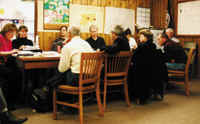
Town
Council meetings in Hamilton are low-tech, a community
get-together around the old oak table. |
small grocery, a farm market, a
diminutive neighborhood school, a new bank, four churches (the Baptist
church in the middle of town doubled in size last year), a modest
restaurant and a tiny diner.
Visitors flock to Loudoun for the big
things � the Celtic Festival, the antique fair at Oatlands, the horse
races and corporate bashes at Morven Park, the Waterford Fair.
They come to Hamilton for a quiet
night�s rest, a good meal and a quiet day in a peaceful, harmonious
town. The two B&Bs in town attract wedding guests, fox hunters,
bicycle trekkers and family historians. The biggest problems the council
and the citizens have faced recently are impatient drivers and bringing
the sewer plant up to state standards.
|
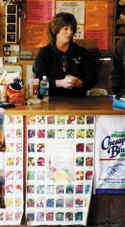
Leslie
Lowry offers fresh local produce, locally grown meats and
foodstuffs, and oysters in the "R" months at Lowry's
Farm Market. |
Some things never change. The councilmen
of March 12, 1875, passed an ordinance to prevent fast driving or riding
through the streets (and to assess fines for errant cows and hogs).
Back in the Day
Hamilton�s heyday came in the years
between 1868, when the railroad came out this far, and 1926, when the
businesses and homes at the core of the town burned to the ground.
The railroad paved the way for summer
visitors from swampy and un-air-conditioned Washington, DC, to the east.
Like Purcellville, Round Hill and Bluemont to the west along Route 7,
Hamilton beckoned to those summer refugees. And it built sprawling
Victorian boarding houses to put them up in mountain (or at least hilly)
coolness for the hot, humid summers.
The railroad went out of business years
ago, but the right of way became the Washington and Old Dominion Railroad
Park, 30 yards wide, 45 miles long, from Alexandria to Purcellville.
Bikers and hikers exit the trail � paved for bikes and prams and
skateboards, crushed bluestone for horses � at Ivandale Street and spend
the night at one of the two bed-and-breakfast establishments in town.
Bill and Vicki Gallant moved to Hamilton
in 1988 from then-rural Ashburn (where their house stood is now a
four-lane highway) to fulfill two dreams � live in a stone house, run a
B&B.
�I�ll buy that for you,� Bill said
one day, when they drove by and saw the �for sale� sign in the front
yard.
He did, and Stonegate is open for
visitors from Easter Monday to Thanksgiving.
Breakfasts are simple and mouth-watering
� strata, fruit, toast, �and Bill�s Belgian waffles are to die
for,� according to Vicki.
The fieldstone Georgian house holds
court in the center of a two-acre lawn �including a 150-year-old
cucumber magnolia that boasts a 16-foot circumference. Both guest rooms
have private baths, one with a whirlpool tub.
Stonegate was built in 1938 by Dr.
William Frazer for his new bride Anne. Before that, the sweeping lawn was
home to Sommervilla.
The Sommerville (or Sommervell) sisters
built a large frame home on the grounds in 1881. The bustle of
construction drew the attention of The Loudoun Telephone, which commented,
�This new house will be quite an addition to our town.�
�References given and required,�
read a tourist brochure distributed by the Telephone Power Press at the
end of the century. �Parties with children need not apply.�
Sommervilla, as it was known, burned to
the ground in 1924, two years before fire devoured the downtown block. The
Gallants offer visitors photos of both Stonegate and Sommervilla.
Boarders can spend the day visiting the
local antique shops, biking to the Blue Ridge mountains to the west, or
getting in the car for a visit to the new Air and Space Museum annex at
Dulles Airport, about 20 miles away.
Where to Eat
|
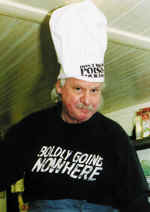
Owner
and chef Tim O'Neil holds culinary court at Hamilton's Planet
Wayside, the number-one pick on Donovan Kelly's list of the top 50
"Crummy But Good" eateries in the Washington metro area.
O'Neil's signature blackboard message changes daily---and never
lacks attitude. |
For meals, there�s Planet Wayside
�inspired soups, sandwiches, specials and barbecued brisket served up
with attitude � on the west end of town, and the Beautiful South �
neo-American country cum middle European nouveau � at the east entrance.
Planet Wayside � passersby always slow
down to check out the latest bon mot from owner Tim O�Neil on the
blackboard out front � seats 28 inside and 40 on the patio out back
(dodge the poison ivy in the corners). The ramshackle hut was the food
court for Ivandale Wayside Gardens in the 1930s.
Planet Wayside copped the number one
ranking for �crummy but good� eateries in the Washington metro area,
in Donovan Kelly�s �Quest for the Holy Grill.�
Madeleine Albright, a Loudoun resident,
has brought friends to dine here, much to the
consternation of her security
detail (�the wrist talkers�). O�Neil�s version of the Secretary of
State�s adventure ran in the county weekly, The Loudoun Times-Mirror,
and is now local legend. O�Neil will tell the story with minimal urging.
The Ivy Hall B&B, just off South St.
James Street, offers two full rooms and a suite. Owner is Georjann Overman
(she threw over life as a HUD lawyer for life in the country).
|
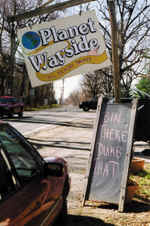
Planet
Wayside |
Overman is hostess and chief cook (and
probably bottle washer). �I like my own cooking,� she said. The menu
is open to suggestion � fruits, homemade breads, French toast, eggs,
quiche, blintzes.
Ivy Hall was built in 1881 by local
mason Richard Ruse as a summer home for the Rev. Henry Branch, a
Presbyterian circuit rider. It�s all brick, right down to the interior
walls, and boasts two-story bay windows and natural light throughout.
Special requests are no problem. Last
season Georjann served up a Passover dinner.
|
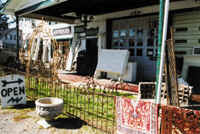
Even
before getting into town proper, antiquers stop at Hamilton
Antiques. |
A trip to the past starts at Hamilton
Antiques, where John Ware settled in an old garage across the road from
the Beautiful South two-and-a-half years ago. He�s been a restorer for
more than 25 years, and the store offers everything from painted furniture
to architectural salvage. Ware will convert a piece � an armoire to an
entertainment center, perhaps � but not at the risk of �corrupting a
true antique.�
Stephanie Ware specializes in old
chandeliers. The entire first floor glistens with crystal prisms, glass
bead chains and tiny lights.
|
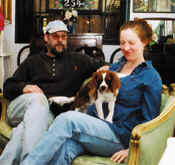
John
and Stephanie Ware, with Emma assisting, stock their shop with
furniture, art and architectural salvage from around the
world. |
A little further west is the Natural
Mercantile, in the building that was once the Laycocks� market. Hamilton
is a leader in adaptive reuse � the brick Masonic building was once a
school and now houses a woodworking trade.
The Mercantile is more than a grocery,
started by Swedish native Eva Rudland in 1983. �It�s a cultural
experience,� says clerk Sue Phillips. A community bulletin board
(llamas, horses, bank loans, dance lessons, tai chi) fills the wall behind
the bins of bulk-served organic foodstuffs.
Everything in the store, dairy products,
produce, bread, honey, even the peanut butter and the snacks for hikers,
is guaranteed organic.
Visitors can stock up on cool drinks and
organic snacks and head west for the rest of the antique experience �
Hamilton Station in the center of town, next door to Town Hall (which
shares a parking lot with the Hamilton Volunteer Fire Company), and
Hamilton Country Road across from the Post Office.